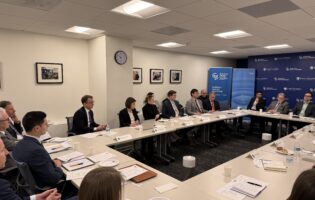Germany’s Russia Policy: Comparative Perspectives and Consequences for Transatlantic Relations
With Russia massively intervening in the internal affairs of Ukraine and the harsh rhetoric coming from the United States, it seems as if these two old adversaries are re-establishing the old East-West conflict of the Cold War era. But the question for Germany has become whether it can follow its moral compass, protect its economic interests, and negotiate a strong transatlantic response with the U.S in order to manage the conflict.
DAAD/AGI Research Fellow Dr. Hannes Adomeit presented his research on May 27, 2014, by elaborating on four key dimensions of the German position. First, he talked about the attitudes of the “main-stream” government, citing several interviews with German Chancellor Angela Merkel (CDU) and Foreign Minister Frank-Walter Steinmeier (SPD) in which they not only defended the utility of the current sanctions package against Russia but also called for a “new approach” that did not revert to the outdated containment ideals of the Cold War. The second dimension included the critics claiming that the sanctions were too soft on Russia, a view which is held by the majority of the German public. Dr. Adomeit explained via graphs how the Crimean crisis contributed to lowered German trust of Russia while simultaneously raising trust of the United States. The reason was most likely because “the big bear is on the loose,” as one of the participants said in the discussion, signifying Germans retreating to the transatlantic relationship in the face of Russian assertiveness. The third dimension is the camp of the so-called Russlandversteher, or more aptly the Putinversteher, who are sympathizers of Russian President Vladimir Putin, claiming that the annexation of the Crimea was “not such a big deal” and that interpretations of Russian “aggression” were exaggerated and that sanctions had gone too far. Members of this group are diverse, ranging from former SPD chancellors Helmut Schmidt and Gerhard Schröder, die Linke, NDP and AfD to economic leaders. The fourth dimension concerned the likely consequences the conflict in Ukraine on transatlantic relations. They would depend on two developments, the course of events on the ground and U.S. domestic politics.
The ensuing discussion ranged broadly from historical Ostpolitik, potential spill-over of Russian interventionism in eastern Ukraine to Transnistria (Moldova), and the effect of sanctions on the ongoing Energiewende. At the end of the session, two questions were posed concerning future relations: how will the changing composition of Brussels and Washington affect responses to this crisis, and can a coherent transatlantic policy be formulated despite changes in government? Only time will tell if the United States and Germany can overcome significant domestic and international political hurdles and construct a strong, coherent, and politically responsible transatlantic response to renewed Russian assertiveness.
Please contact Ms. Kimberly Frank with any questions at kfrank@aicgs.org.







